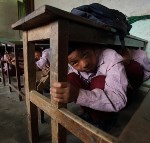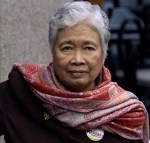Social Watch news
Published on Wed, 2015-04-29 10:34
It is not surprising that the political battles have already become fierce in the concurrent negotiations for the Third International Conference on Financing for Development (FfD3) and the post-2015 development agenda with its Sustainable Development Goals (SDGs). At stake is who will shape the agenda—and how much real impact it will have. What is the direction of the “transformation” that is now so frequently discussed in both talks? Are we headed towards a world of multistakeholder partnerships and the increasing outsourcing of public functions to private control, where those in positions of privilege can maintain their entitlements, at least until we fully breach planetary boundaries? Or towards a world where we make decisions based foremost on the welfare of the majority of people and the planet? |
Published on Sun, 2015-04-26 00:00
As the co-facilitators of the Third Financing for Development Conference, to be held in Addis Ababa (Ethiopia) coming July released the first draft outcome document for negotiations (“Zero draft” or “the Draft”), RightingFinance issued a human rights assessment of it. A key message emerging from such thorough assessment is that, without significant work on the core chapters, the agreement to emerge from Addis Ababa will frustrate the high expectations set for reaching the Sustainable Development Goals (SDGs) that are at the core of the new development agenda. |
Published on Sat, 2015-04-25 00:00
The death toll has now passed 3,300, and there is no telling how much farther it will climb. Search and rescue operations in Nepal entered their third day Monday, as the government and international aid agencies scramble to cope with the aftermath of a 7.8-magnitude earthquake that struck this South Asian nation on Apr. 25. Severe aftershocks have this land-locked country of 27.8 million people on edge, with scores missing and countless others feared dead, buried under the rubble. |
Published on Thu, 2015-04-23 19:45
How can one push for greater political participation of women in a patriarchal state that believes government is a fraternity? The Cambodian Committee to Promote Women in Politics faced this exact problem when it first started its work to encourage women to get more politically involved in the early 2000s. Back then, CPWP struggled to convince women to become more “involved in decision-making at the national and local levels” not only because of opposition from men, but also because some of these women didn’t see that as their role in politics. |
Published on Wed, 2015-04-22 13:09
The P70-billion block grant that will be given to the new autonomous region in the Philippines during the first year of the implementation of the Bangsamoro Basic Law raises serious questions of accountability, former National Treasurer Leonor Briones said. “The most problematic in terms of accountability is the block grant,” Briones, lead convenor of Social Watch Philippines, told a forum on the BBL at the University of the Philippines Thursday. |
Published on Wed, 2015-04-22 12:52
The European Council is expected to formulate a coherent European response to the continuing humanitarian disaster in the Mediterranean on April 23. The tragic deaths of more than 1000 men, women and children as well as the recognition that the situation is spiralling out of control, seem to have finally alerted Europe to the scale of the crisis. EU High Representative Federica Mogherini for Foreign Affairs and Security Policy – who is also Vice-President of the European Commission – and her staff deserve commendation for their determination and commitment to get things moving. |
Published on Wed, 2015-04-22 12:50
Oil prices are down. Economic growth is down. Employment rates are stagnant. Household debt is climbing to record highs. Canadians could use a break. The 2015 federal budget has one for you. |
Published on Wed, 2015-04-22 12:46
Despite one of the largest humanitarian disasters of recent years unfolding on their doorstep, and another 700 deaths on April 19, the EU and its Member States seem totally paralyzed and incapable of providing an urgent and appropriate response. The deaths of men, women and children only seem to promote further rounds of discussion. These will – in due course - no doubt result in yet another political declaration and yet more empty promises. |
Published on Wed, 2015-04-22 12:30
The outcome of the Third International Conference on Financing for Development (FfD3) will affect the ability of states to fulfill their human rights obligations, and achieve the Sustainable Development Goals (SDGs) and targets being set for the post-2015 agenda. Both human rights and the SDGs are similar in that they are universal, and entail individual as well as common responsibilities, taking into account varying national capacities to achieve them. The SDGs take three different forms: those of particular relevance to the internal affairs of all countries, including rich ones, requiring changes in their domestic policies; those that address the need to change domestic policies in order to reduce negative external effects beyond a country’s borders; and those that zero in on international duties and responsibilities. The last two mainly apply to wealthier countries. |
Published on Fri, 2015-04-17 09:52
Getting the right balance between public and private sector roles and responsibilities in the Financing for Development and Post-2015 process will be fundamental to prospects for sustainable, inclusive development. Yet early evidence suggests this balance is already awry, skewed far in favour of private interests. Are we seeing a process of outsourcing the international agenda? There’s no question that businesses around the world are sources of growth and employment. But they are also the source of the most serious threats to sustainable development—from pollution to illicit financial flows that undermine prospects for public resources. Can we have a transformative development agenda without the transformation of business? |
SUSCRIBE TO OUR NEWSLETTER











